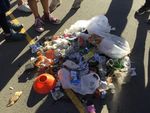Is Plastic one of our enemies or one of our greatest creations? "Water & air, the two essential fluids on which all life depend
←
→
Page content transcription
If your browser does not render page correctly, please read the page content below
Is Plastic one of our enemies or one of our greatest
creations?
“Water & air, the two essential fluids on which all life depend
upon, have now become global garbage cans.” said Jacques
Cousteau
Plastic- whether it be a container, some sort of packaging or perhaps a simple bottle cap,
they have become an everyday part of our lives. This isn’t necessarily a bad thing. Plastic is
also the material diabetics use for their disposable syringes; arthritic patients have for their
replaced hips, and it’s what builders and bikers use to protect their heads from a serious
injury.
But when plastic reaches our ocean whether it be chip packets or drifting fishnets, it poses a
threat to animals that depend on the ocean for food.
The environmental consequence of plastic solid waste, are visible in the ever-increasing
levels of global pollution both on land and in the ocean. More and more marine animals are
suffocating and dying every day. Each year, 100 million marine animals including whales,
dolphins and turtles are killed because of plastic. To a sea turtle, a plastic bag floating about
in the ocean looks exactly like a jellyfish which is one of their main food sources. Once they
have eaten the bag it becomes jammed in their digestive system and they can no longer eat
anything else, finding it hard to breathe. Plastic pellets, (the small, hard pieces of plastic
from which plastic products are made) look like fish eggs to sea birds such as the Chatham
Island albatross. They are now endangered because they’re consuming the plastic pellets
that was residue from milk lids and other plastic, it then kills them.
Do you ever wonder how much of plastic bags we throw away, actually makes its way into
the ocean? 80 percent of the plastic bags we throw away goes into the ocean each year. My
local supermarket, Countdown has introduced their new reusable fabric bags for only $1.
This is a great idea and we think all supermarkets should have the same system. More
solutions that are worth investigating are:
• At the butchery the meat should be fresh and in a paper bags NOT wrapped in
plastic.
• All fruit and vegetables should be fresh produce NOT in plastic . Especially
strawberries!
• Peanut butter and other spreads should be in glass jars as then they are reusable.
• The plastic bags that are used to put fruit in should be paper or cloth bags instead,
like the mushroom bags we use.Before the days of plastic, when fisherman dumped their trash overboard or lost their net, it did not damage our oceans because those materials were natural such as, metal, cloth or paper. These materials will either sink to the bottom or biodegrade quickly. The point of this, is when we throw away rubbish/plastic there really is no ‘away’. Kiwi company Enviroplaz has made high quality concrete, made of plastic waste, which could be the solution to plastic pollution. If we use the plastic concrete to fix the roads in Christchurch (caused from the 2012 earthquakes) we could use loads of our our waste. If you find a stray glass, aluminium or plastic bottle in a country like Australia, you can take it to a special machine that collects the bottles and, depending on how much the bottle is worth, it gives you money. Now we should definitely have those in New Zealand. If you go down to the New Brighton shopping area in Christchurch, you will find a shop called Bin Inn. Bin Inn is a mini market where you bring your own containers and buy whatever you want in bulk, including nuts, cake mixes, meat, chips. You can even make your own peanut butter (and it tastes great). Our school (South New Brighton School) is known to be an ‘enviro’ school, but we walked around the school and found lots of plastic that had tried to be hidden by students who clearly don’t care about the beautiful environment that surrounds us. We use to have our lunch outside and enjoy the beautiful weather but because some people don’t care and throw their rubbish on the ground we now eat inside. This has turned out to be a great success. Just outside our school there is a really cool playground, but it always seems to be filled with plastic and rubbish. They have two bins but unfortunately this does not help. The bins are always filled to the brim. I personally don’t think that we should have rubbish bins on the beach or at the park anymore. If rubbish bins at the beach were non-existent, people would be encouraged to take their rubbish home and not dump it in the nearest bin (or beside the bin). Seabirds, mostly gulls, rummage in the bins to find food for their young and they usually find plastic. If the seabirds are not finding food for their young, then they are just being a pain and dragging all that plastic out to sea. CONCLUSION: Plastic is not always a bad thing, but just remember that there are other people and animals living around you, and when you go to the supermarket to buy your weekly groceries, remember to reduce the amount of plastic you use. Websites: www.stuff.co.nz www.theoceancleanup.com theconversation.com www.utas.edu.au plastic-pollution.org This is how much plastic we found in our school after lunch, we also rummaged around the borders of our school to see what we could find, (the pile is much bigger in reality). It was disgusting. The photos were taken on my iPad on the 23/5/2018 at 2:27 pm
You can also read




















































